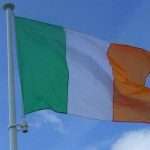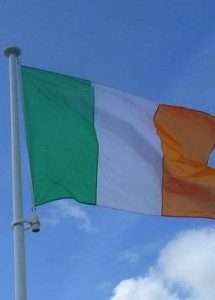The dangers of the truth
Among the most pointless of deaths in Easter Week of 1916 was that of the the Irish pacifist and feminist Francis Sheehy-Skeffington. Attempting to organize a group to prevent looting, he was arrested by British soldiers at Portobello Bridge. Used as a hostage by the army, he and three others were summarily shot under the orders of a British officer.
The attempt by the British to cover up the murders was thwarted by Major Francis Fletcher-Vane, who had been ordered to bury the bodies. Vane took his complaints to the highest authorities and was discharged from the army later that year for his part in the affair. On the other hand, Sheehy-Skeffington’s murderer pleaded insanity at a court martial and was sent to Broadmoor where twenty months later he was deemed to be cured. He retired to Canada on an army pension.
The story of the gentle Sheehy-Skeffington, the friend of James Joyce, Oliver Saint John Gogarty and Tom Kettle; the story of the man whose feminism included taking the name of his wife Hanna Sheehy and combining it with Skeffington, his family name; the story of the lifelong pacifist who would take arms against no-one; the story points to the complete ineptitude of the British response.
Major Vane’s dismissal from the army became the subject of questions in the House of Commons, a debate that is recorded in the edition of Hansard for 1st August 1916:
Mr. KING asked whether the Brigadier – General Commanding the 178th Brigade recommended Major Sir Francis Vane for mention in dispatches for his distinguished conduct when in command of the attack on the South Dublin Union; whether Sir Francis Vane came to London to report to the Prime Minister and Lord Kitchener the murder of Messrs. Skeffington, Dickson, and M’Intyre; whether Sir Francis Vane was thanked by the Prime Minister and Lord Kitchener for this service; whether the report of the Brigadier-General was held back by Sir John Maxwell and not forwarded by him to the Army Council; whether Sir John Maxwell sent an adverse report on Sir Francis Vane’s conduct, with the result that Sir Francis Vane is now unemployed; and whether, in view of the services of this gallant officer, any action will be taken to make available Sir Francis Vane’s services in the field?
Mr. O’DONNELL asked the Secretary for War whether he is aware that Sir Francis Vane, one of the officers in command, made a personal report to Lord Kitchener respecting the murders of Messrs. Skeflington, Dickson, and M’Intyre, and thereby, one week after the crimes had been committed, obtained the arrest of Captain Bowen-Colthurst, for which action he was thanked by the Prime Minister and his action approved by Lord Kitchener; whether he is aware that the treatment of the civilian population by Sir Francis Vane during the rebellion has won the confidence of the Irish people; whether he is aware that Sir Francis Vane has been now unemployed for two months either in a military or in a civil capacity; whether he is aware that Major Sir Francis Vane was one of the first officers to report himself at the front in this War, coming from Italy at his own expense and joining the French Army at Belfort on 14th August, 1914, and on his return to England he, of his own initiative, raised 500 men for the Army from among the London stores and factories and for one year trained the officers and men of a battalion of the Royal Munster Fusiliers, whose attachment and loyalty to him have been publicly expressed; and whether he proposes to take any action in the matter?
Mr. FORSTER If the hon. Member wishes to regard this matter in the light of the ordinary practice as regards mention in dispatches, I must point out to him with reference to the first and fourth parts of the question that it is not customary for Commanders-in-Chief to forward with their dispatches the reports of subordinate commanders, and the Army Council have no knowledge of any recommendation having been made by the officer referred to. On the general question of the further employment of Sir Francis Vane, I can only say a report has been received from Lieutenant-General Sir J. Maxwell that this officer’s services are no longer required for recruiting duties, and as there is no other employment for which he is required he is now unemployed. He was adversely reported upon as a regimental officer and cannot be employed in this capacity again.
Mr. O’DONNELL Is the hon. Gentleman aware that Colonel Maconochie, on the 8th May, reported as follows on Sir Francis Vane: “That he rendered valuable assistance, that his dispositions were excellent, and that he recommended him to be mentioned in dispatches, and to be permitted to return to the front”; and whether it is a fact that Sir J. Maxwell has now discontinued his services solely because he reported, and insisted upon reporting, the murder of Skeffington and others in Portobello Barracks?
Mr. FORSTER I have no reason whatever to think that is the case.
Mr. O’DONNELL Will the hon. Gentleman make inquiries whether this report which I have read is true or false?
Mr. FORSTER I will represent it to my Noble Friend the Under-Secretary for War.
Mr. KING As this is a matter which obviously is one of great public importance, will the hon. Gentleman press for a definite report upon the subjects mentioned in these questions and the allegations contained therein?
Mr. LYNCH Will the hon. Gentleman direct his investigations to this point— whether the gist of the matter is that a zealous and efficient officer has been punished because he set his foot in the way of the illegal operations of the military, and that the whole influence, esprit de corps, and chicane of Government Departments is now being used against him?
Mr. FORSTER I do not think there is a word of truth in those allegations.



Comments
The dangers of the truth — No Comments
HTML tags allowed in your comment: <a href="" title=""> <abbr title=""> <acronym title=""> <b> <blockquote cite=""> <cite> <code> <del datetime=""> <em> <i> <q cite=""> <s> <strike> <strong>